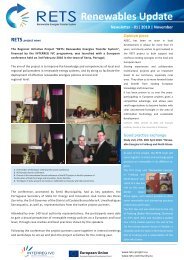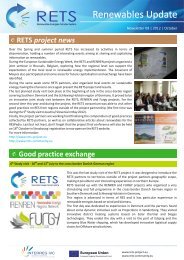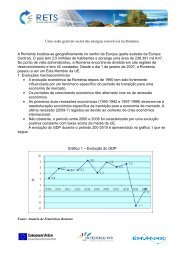Promoting renewable energies - RETS Project
Promoting renewable energies - RETS Project
Promoting renewable energies - RETS Project
You also want an ePaper? Increase the reach of your titles
YUMPU automatically turns print PDFs into web optimized ePapers that Google loves.
Socio-economic aspects of <strong>renewable</strong> <strong>energies</strong> in the<br />
EU<br />
According to reports, sales of more than €120 billion<br />
were made by the <strong>renewable</strong> energy sector in the EU<br />
in 2009 11 . The rankings were headed by Germany, with<br />
total sales of nearly €37 billion, followed after a<br />
considerable gap, by Denmark, France and Sweden,<br />
which together made a further €36 billion. Thus a total of<br />
60% of sales by the entire <strong>renewable</strong> energy sector was<br />
due to these four countries. With more than €38 billion –<br />
i.e. nearly one third of the total volume – wind energy is<br />
the sector with the biggest sales. Solid biomass and<br />
photovoltaic power take second and third place.<br />
In 2009, there were already 910,000 jobs in the<br />
<strong>renewable</strong> energy sector throughout the EU. With<br />
over 333,000 jobs, Germany had the largest share,<br />
followed by France with a further 135,000 jobs. As far as<br />
the individual sectors are concerned, solid biomass<br />
comes first with about 284,000 jobs, followed by wind<br />
energy with about 244,000 jobs. In 2010 more than 3.5<br />
million people were employed in the <strong>renewable</strong><br />
<strong>energies</strong> sector world-wide.<br />
Figure 2: Sales in the RES sector 12<br />
Professional qualifications and accreditation in the<br />
<strong>renewable</strong> <strong>energies</strong> sector<br />
Successful transition to a sustainable economy, and<br />
increased deployment of RES technology, requires<br />
employees with the right skills and qualifications.<br />
Research, manufacturing, operations and maintenance,<br />
construction and development are all areas of<br />
employment growth within the RES sector and will<br />
continue to develop as the industry secures further<br />
investment. However, there is often a lack of appropriate<br />
training at Further/Higher education institutions and<br />
11 http://www.erneuerbare-energien.de/inhalt/42848/42761/<br />
12 EmployRES Study: The impact of <strong>renewable</strong> energy policy on<br />
economic growth and employment in the European Union, carried out<br />
for the Directorate-General for Energy and Transport in the European<br />
Commission,<br />
http://ec.europa.eu/energy/<strong>renewable</strong>s/studies/doc/<strong>renewable</strong>s/2009_e<br />
mploy_res_summary.pdf<br />
<strong>RETS</strong> Compendium – © 2012 <strong>RETS</strong> Consortium<br />
15
















